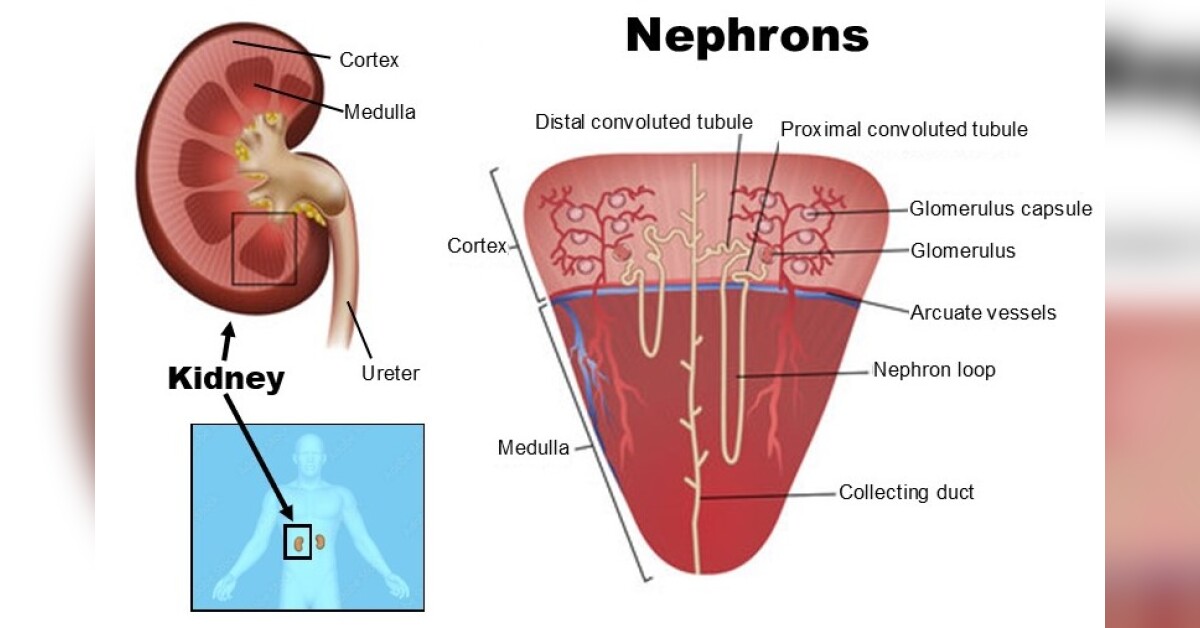

Your kidneys are bean-shaped organs about the size of a computer mouse that sit at the lowest level of your ribcage, one on each side of your spine.
The kidneys are responsible for maintaining a healthy balance of water, salt and minerals — including sodium, calcium, phosphorus and potassium — in your blood. If these substances aren’t in balance, your body’s nerves, muscles and other tissues may not function properly.
The kidneys also remove extra fluid, acid, waste products and drugs from your body. They release hormones that regulate blood pressure; produce a form of vitamin D that promotes strong, healthy bones; and control the production of red blood cells.

A kidney is made up of about a million functional units called nephrons. A nephron consists of a filtering apparatus called a glomerulus, which is made up of tiny blood vessels and is attached to a tubule. Blood enters each glomerulus and is filtered. The remaining fluid passes along the tubule, where chemicals and water are added or removed based on the body’s needs. The fluid that’s left becomes urine, which is passed through the ureters to be stored in the bladder.
The kidneys filter about 200 quarts of fluid every 24 hours. About 2 quarts are removed from the body as urine. The remaining 198 quarts of fluid are recovered and returned to the body. The kidneys filter all the blood in your body every 30 minutes.
Diseases of the kidneys, specifically chronic kidney disease (CKD), are major causes of illness and death. Fifteen percent of adults in the US are estimated to have CKD, which equates to about 37 million people, or one in seven. Because early CKD generally has no signs or symptoms, most cases are undiagnosed.
When present, warning signs that you may be developing kidney disease may include fatigue, trouble sleeping, itchy skin, swollen feet, muscle cramps, puffiness around your eyes in the morning and frequent urination, particularly at night.
There are also symptoms that may indicate the disease is progressing to kidney failure, also called end-stage renal disease (ESRD). That’s when the kidneys lose all ability to filter fluid and waste products from the blood.
Symptoms of the progression to ESRD may include nausea, vomiting, loss of appetite, changes in urine output, fluid retention, anemia, decreased sex drive, sudden rise in potassium levels and inflammation of the pericardium, the fluid-filled sac that surrounds the heart.
Diabetes is the leading cause of kidney disease. It accounts for about 44 percent of cases. Consistently high blood glucose (sugar) associated with diabetes damages the blood vessels, including in the kidneys. As a result, the kidneys cannot filter blood as efficiently as they should, and excess fluid and waste build up in the body. That can lead to other health problems, including heart disease and stroke.
Other risk factors for chronic kidney disease include having high blood pressure; having a family history of kidney disease; being older; having heart disease; smoking; being obese; being African American, Native American or Asian American; and having an abnormal kidney structure.
Controlling diabetes and high blood pressure are essential to maintaining kidney health. Other ways to keep kidneys healthy and prevent kidney disease include:
- Maintain a healthy weight
- Quit smoking
- Exercise regularly (Regular exercise can help with weight loss and reduce blood pressure.)
- Eat a diet rich in fruits, vegetables, whole grains, lean meats and low-fat dairy
- Avoid extra salt (Eating a lot of salty food can disrupt the body’s balance of minerals.)
- Stay hydrated (Drinking plenty of water helps kidneys remove toxins from the blood.)
- Limit use of over-the-counter medications (Routinely taking certain OTC medications, such as NSAIDS, can damage kidneys over time. If managing a condition with pain, such as arthritis, talk with a doctor about alternatives to daily pain medication.)




Leave a Reply